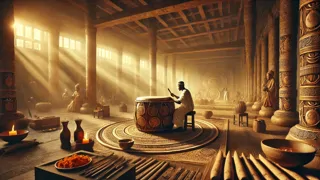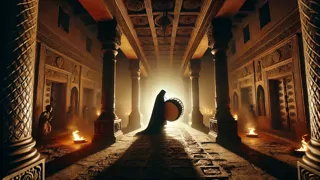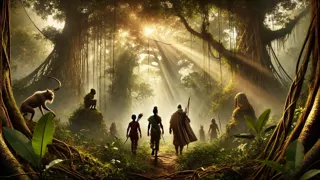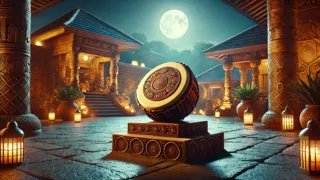Introduction
In the rolling green hills of the ancient Yoruba kingdom, a story whispered through the canopy of mahogany and iroko trees spoke of a drum molded from enchanted wood and bathed in the first light of dawn. The drum belonged to a wise and generous king named Oba Adétúnjí, whose laughter echoed through marble corridors like a promise of bounty. Each time he led a midnight festival in the moonlit courtyard, he pounded the head of that magic drum and summoned steaming platters of yam pottage, fragrant jollof rice, rich egusi stew, and golden plantains candied with palm sugar. The aroma danced through every chamber, reaching the hearts of peasants and nobles alike, reminding them that in unity there was abundance. Word of the drum’s power spread beyond the palace gates, drawing traders, travelers, and wandering mystics who bowed at Oba Adétúnjí’s feet. Yet within every legend lies a shadow: a whisper of avarice that grew in the hearts of a few, hungry for the drum’s magic for themselves. The old palace sage, Babaláwo Ifábí?´mi, warned of a reckoning if the power was wielded for self-interest. Now, that warning rests on the edge of oblivion, for when greed strikes, even enchantment may falter. This is the prelude to a tale of wonder and warning—the journey of the King’s Magic Drum, from dazzling festivals to the brink of loss, where every beat resonates with hope, fear, and the fragile promise of generosity.
The Drum’s Creation and First Feasts
In the heart of the Yoruba forest, a sacred grove stood shrouded in morning mist. The rumble of distant waterfalls mingled with the rustle of silk grasses under ivory skies. Ancient cedar and ebony trees had lived for centuries before a royal artisan named Adewale approached them with reverence. Guided by the palace Babaláwo, Adewale selected a fallen branch split by lightning, believing its spirit aligned with cosmic forces. As dawn broke, he cut the wood with a ceremonial blade forged from iron rich in river ores. Each strike of the chisel echoed with whispered chants, calling upon ancestral guardians to bless the timber. Locals watched in hushed wonder as symbols of unity and abundance emerged under Adewale’s skilled hands. He carved the drum’s head with the image of the sun and moon intertwined, representing harmony between day and night. Marigold petals and ground cinnamon imbued the surface with protective scents, while a ribbon of gold traced a path around the circumference. The Babaláwo anointed the drum with palm oil and poured libations of kola nut juice at the four compass points. A chorus of temple musicians gathered at sunset to test its power, striking the first beat under a silver moon. When the rhythm met the night wind, the air shimmered with luminous motes like fireflies. Then, as if answering a silent plea, a banquet materialized on a low wooden table. Bowls of steaming egusi stew, platters of jollof rice bright as sunset, and mountain-high stacks of pounded yam appeared in rich splendor. Children’s laughter rang out like bells across the courtyard, and the drums of distant villages joined in unison. The Feast of Dawn had begun, and the kingdom tasted a future where generosity overflowed alongside the magic drum’s melody. As the elders circled around that glowing wood, their palms pressed gently against the drum’s polished surface. The scent of burning sage mingled with fragrant ginger tea poured into clay cups, creating an atmosphere of reverence. Through the hush of anticipation, a lone hawk cried in the distance, echoing the call of eternity itself. Before the final blessing, Adewale painted intricate dots of red ochre along the drum’s rim, marking the lives it would sustain.

News of the magic drum spread beyond the palace walls with the urgency of a rising tide. Caravans of traders arrived bearing exotic spices and silken cloth to witness the marvel. When the drum sounded a single thundering beat, bowls of okra soup glowed with emerald hues as if caught in sunlight. Fishermen brought in baskets of tilapia that had never tasted so fresh, and bakers watched in awe as fufu rose like golden clouds. The palace gates swung open to villagers who knelt in gratitude, tears of wonder glinting on their cheeks. With each festival, the chorus of gratitude grew louder, and the rhythms of gratitude wove together hearts that once beat apart. Children wore crowns of woven grasses and danced in circular patterns, chanting words of thanks in ancient tongues. The royal musicians learned new rhythms, blending traditional drums with the enchanted drum’s unique tone. One night, a traveling griot told tales of how this drum echoed the heartbeat of the earth itself, resonating with hidden rivers beneath the desert sands. Even emissaries from neighboring kingdoms knelt before Oba Adétúnjí, hoping to earn a transient taste of boundless generosity. Yet not every heart remained open; some viewed the drum’s power as a prize to be hoarded rather than shared. In whispered corridors, conspirators plotted to seize it for their selfish ends, dreaming of using its magic to accumulate vast treasures. Greedy nobles measured their fortunes not in smiles but in sacks of gold, their eyes dimmed by an insatiable hunger. They envied the humility of farmers who bowed before the King and found themselves outcast by their own desire. Meanwhile, the Babaláwo continued to teach that the drum’s spirit would leave if greed tainted its purpose. He performed nightly rituals to renew its bonds with the ancestors, breathing life into carved symbols before lowering incense smoke into its hollow core. Under candlelight, he traced protective signs and reminded the court that abundance born of avarice can vanish like morning dew. Through it all, Oba Adétúnjí stood as a beacon of balanced prosperity, wearing a crown heavy with responsibility and compassion. He knew that the greatest test for any jangled spirit is the weight of human intent.
As the drum’s power blossomed, the courtiers gathered nightly in woven mats beneath starlit roofs. Allied chiefs brought offerings of kola nuts and woven silk, honoring both history and hope. Archers from the frontier lit torches that flickered like captive stars, illuminating gleaming spears at the palace gates. Dancers moved like flowing rivers, their ankles jingling with bronze bells in perfect sync with the enchanted drum. But in hollow rooms hidden from candle glow, small bands of nobles whispered of personal gain. Their greed found voice in hollow laughter, as they measured the drum’s magic against the weight of ivory trinkets. Each secret meeting deepened the shadows that clung to marble pillars and silk tapestries alike. When Oba Adétúnjí learned of the treachery, his smile dimmed like the final ember of a dying fire. He consulted Babaláwo Ifábí?´mi beneath a cedar tree that had witnessed centuries of confessions. The sage’s eyes, clouded by time, reflected both sorrow and unwavering resolve. They agreed to hide the drum inside a vault carved from living rock beneath the palace floors. Yet on the night of renewal, a single conspirator slipped inside, guided by treachery and torchlight. He lifted the heavy lid of the vault and stole the drum, believing its power was his alone to command. The walls held their breath as the magic drum vanished, and a silence more profound than any darkness took its place. Morning came, and with it a hollow echo where the drum once sounded. Plates of untouched rice and stacks of cold pounded yam stood as silent witnesses to what had transpired. Oba Adétúnjí’s heart pounded with grief, his people’s hope flickering like a dying ember. That tragic moment marked the end of boundless feasts, the beginning of an arduous search to reclaim not just a drum, but the kingdom’s very soul. For a greatness found and then lost can only be recaptured by courage, perseverance, and the grace of unity.
Seeds of Greed and the Drum’s Disappearance
Within the palace’s secret corridors, envy festered like a venomous serpent coiled beneath marble tiles. The conspirators, cloaked in midnight blue and deep scarlet robes, gathered around a flickering brazier that spat embers into the cavernous hall. Among them, Prince Akanni’s voice trembled not with fear but with desperate longing, as if the drum’s magic drummed inside his own chest. He traced the carved symbols with a trembling finger, imagining the treasures he could amass beyond the crown he would never inherit. Their whispers bounced off polished stone, conjuring visions of roads paved in gold and vaults brimming with endless grain. A commander in iron-lined sandals reminded them of their station, urging haste before the Babaláwo noticed a shift in the drum’s spirit. Plans formed like dark clouds ready to burst, mapping escape routes through the underbelly of the palace. At a single signal, they would fall upon the vault’s guardians, snatch the drum, and vanish beneath the labyrinth of hidden passages. Yet beneath the swagger lay a fragile thread of doubt, for anyone who wielded such magic risked its judgment if borne from corruption. The conspirators silenced it with a curt nod, steeling their hearts against guilt. They understood the price of failure but ignored the toll on their very souls. As storm clouds gathered outside the palace, a hush fell over the courtyard’s statues of forgotten kings. No breeze dared stir the drum’s woven tassels, heavy with palm fronds and painted patterns. In that pregnant moment, destiny waited for a single, dripping raindrop to shatter complacency. In the grand dining hall, Oba Adétúnjí raised his goblet, unaware of the betrayal’s quiet pulse. His eyes glowed with generosity, believing the drum’s magic was a gift to unite all who called his realm home. But power drifts like water, and when greed digs its roots deep, even the mightiest current cannot hold its course. As the clock struck midnight, the grand hall fell into a trembling silence, as if time itself held its breath. Torchlight danced on polished shields, casting elongated shadows that seemed to whisper of imminent doom. Beneath the searing hush, the conspirators moved like phantoms, ready to snatch the fate of an entire kingdom from its resting place.

On the eve of the new moon, the palace plunged into inky darkness, pierced only by the faint glow of lanterns hung from alabaster columns. The conspirators crept past slumbering guards, their cloaks brushing against marble floors slick with ancestral dust. At the heart of the vault, the drum lay sleeping within a stone alcove carved by ancient hands. Its surface shimmered as if alive, pulsing with the heartbeat of every belly it had filled. Hands trembling, Prince Akanni lifted the drum and felt a surge of power ripple through his bones. In that instant, the spell reversed: the walls sighed, and the distant roar of waterfalls grew deafening. He marched toward the hidden passage behind the council chamber, footsteps muffled by woven tapestries depicting battles of old. Each step stole a piece of his courage, yet greed lent him renewed resolve. Outside, a breeze carried the scent of jasmine and burning sandalwood, masking the oil from their torches. The conspirators slipped through a side door to the forest paths, leaving behind a realm poised on the brink of famine. When dawn broke, the palace awoke to emptiness where abundance once thrived. Tables stood bare, bowls collecting dust, and the great drum’s silent absence echoed louder than any cry. Oba Adétúnjí rushed to the vault, his heart pounding like a war drum, only to find carved stone and echoes in its place. He pressed a palm against the cold rock, whispering prayers to ancestors rumored to dwell in the very marrow of the hills. Meanwhile, the ritual fires went cold, and the Babaláwo’s chants fell into troubled hushes. Rumors spread through villages like wildfire, stories of ghostly guests and hollow markets where no food arose. Fear and hunger found a welcome home in the bellies of nobles and peasants alike, reminding them that magic born of unity was as fragile as a single ember in a storm. Beneath the palace gates, a lone guard discovered empty baskets once brimming with fresh yams, his breath hitching in disbelief. Each silent courtyard and corridor now felt haunted by the promise of what had vanished under cloak and dagger. And above it all, the sky wept with sudden rain, as if nature mourned the loss of a gift woven from hope and faith.
Driven by sorrow and a sense of duty, Oba Adétúnjí convened his council at first light, their faces etched with worry lines deeper than age. In the grand hall where the drum once stood, dust settled over carved pillars like a blanket of fallen snow. The Babaláwo spoke of the drum’s essence, warning that revenge born of desperation could doom them all. Scouts returned with tales of flickering torches deep within the forest, leading toward the realm of forgotten gods. A group of brave souls stepped forward: Prince Akanni, seeking redemption; Amina, a cunning hunter with eyes as sharp as her arrows; and Olumide, a wandering minstrel whose songs soothed anxious hearts. Together, they swore an oath to follow every whisper and wind, to restore the drum’s magic and bring back the kingdom’s hope. Oba Adétúnjí blessed their journey beneath a tapestry of painted doves, his voice firm but tinged with grief. They departed past the closed gates at dusk, each footstep echoing with the weight of entire villages. Lanterns bobbed like fireflies as they crossed rivers swollen from summer rains, unearthing footprints that glowed faintly with residual enchantment. At the edge of the marsh, Amina paused to study cracked runes mapped into sun-bleached stones. Olumide recited a lullaby calling on rain spirits to be their guide. Prince Akanni carried the king’s pendant close to his heart, its metal cool and reassuring. Deeper into the dark woods, shadows stretched like living things, whispering secrets older than memory. Yet with every challenge—vine entanglements, hidden ravines, and mischievous spirits—they learned to trust each other’s strengths. Under a canopy of shimmering stars, they lit a small campfire, sharing grain cakes and fresh fruit gifted by passing travelers who had heard of their cause. Their bond grew stronger, forged not by enchantment but by courage, unity, and the unwavering belief that generosity transcends all obstacles. In that moment, hope rekindled like embers awaiting the drumbeat that would awaken the land.
The Quest to Restore Generosity
By dawn’s first light, the trio pressed deeper into the forest, guided by faint drumbeats only audible to those aligned with honorable intent. Towering iroko trees arched overhead, their branches knitting together in patterns that seemed to whisper hidden instructions. Moss covered the ground like a soft, wet blanket that swallowed sound, forcing them to rely on Olumide’s melodic humming to maintain direction. At each forked path, runic markings glowed faintly, etched centuries ago by mystics who foresaw the drum’s disappearance. Amina’s keen eyes caught every symbol, mapping their route with intuitive precision. They crossed a river so clear that the stones beneath looked like scattered jewels, and her reflection smiled back with quiet determination. Prince Akanni’s heart pounded with regret at past conspiracies, but each step forward filled him with hope for atonement. The air grew thick with the scent of damp earth and unseen flowers, as if nature herself cradled their mission. Birds with violet plumage watched silently, perching on vines woven around ancient statues. Beneath a granite arch carved by time, they found scattered kola nut shells, a sign left by the conspirators as they fled with their prize. It marked the entrance to a cavern mouth yawning like a sentient maw. Torches flickered inside, casting elongated shadows that danced wicked dances on the walls. The drum’s distant echo pulsed like a heartbeat, urging them onward. Amina’s arrow hung at Prince Akanni’s side, ready to defend against unseen threats. Olumide raised his staff and intoned a verse that thawed the dark silence, weaving a tapestry of protective sound around them. In that moment, fear and purpose merged into a single blazing resolve. Every breath became a covenant between past mistakes and future redemption. Shadows tapered into fluid shapes as if daring the group to retreat. Yet united by a shared promise, they advanced into the cavern’s maw with unwavering steps.

Within the cavern, the air trembled with magic’s aftershock, sending ripples through stalactites dripping slow, diamond-like tears. Walls carved with ancestral figures glowed faintly as if alive, their eyes guiding or judging each traveler. Amina’s footsteps disturbed hidden glyphs that activated swirling mist patterns on the floor. The mist coalesced into visions of past feasts, joyful faces disappearing into flickers of sorrow. Prince Akanni watched in horror as each vision reminded him of how greed had shattered unity. Olumide chanted a counter verse, unraveling the illusions with harmonies woven from trust and empathy. A jagged fissure split the cavern floor, its yawning gap revealing a pool of dark, reflective water. Legend said the pool tested the purity of one’s heart, promising guidance only to those whose intentions remained untainted. One by one, they knelt at the water’s edge, offering prayers of repentance and solidarity. The water shimmered and revealed three paths: one lined with thorny vines, one engulfed in swirling embers, and one shrouded in silent darkness. Amina pointed to the path of vines, declaring strength lies in overcoming pain. Prince Akanni chose the embers, facing trials of ridicule and scorching truths. Olumide embraced the darkness, discovering voices of doubt that he transformed into guiding hymns. Each path challenged their understanding of generosity: pain, sacrifice, and conviction. When they reconvened, their spirits had been tempered like steel forged in a triple fire. Their hearts beat as one, a triumphant rhythm echoing the true magic the drum had once taught the kingdom. The stone door trembled as if acknowledging their passage. Ivy tendrils unraveled the carved seals, granting them entry. Cool air brushed their faces, carrying the scent of anticipation. Through the opening, the glow intensified, revealing the drum resting on a stone plinth.
At last, they beheld the magic drum, its surface scarred by greedy hands yet still whispering songs of hope. A surge of joyous relief pulsed through their veins, as if the drum itself exhaled in recognition. Prince Akanni stepped forward and laid the king’s pendant upon its head, symbolizing loyalty over avarice. Amina circled the drum three times, her hunting bow laid gently at her feet. Olumide raised his voice in a triumphant song of unity that shook loose unseen chains around the drum’s core. The cavern responded with a symphony of chimes as hidden crystals resonated in harmony. The ground glowed beneath their feet, outlining a path back to the forest’s edge. But a tremor split the plinth, threatening to engulf the adventurers in a cascade of falling rock. Acting as one, they formed a protective circle, chanting words of shared purpose until the earth stilled. As the last echo faded, the drum lifted itself into Amina’s arms, warm and alive. Together, they retraced their steps through thorn and ember, through darkness and doubt, guided by the drum’s gentle throbbing. When they emerged at the palace gates, dawn’s first light bathed them in golden hues. Oba Adétúnjí waited on the threshold, his eyes wide with hope rekindled. United, they placed the drum upon its carved pedestal once more, and a new feast sprang to life—one born of unity, sacrifice, and the shared promise to protect generosity above all else. Plates of vibrant rice and steaming pots of soup materialized once more, scents of celebration filling the morning air. Songs of gratitude rose from palace balconies, weaving through streets where villagers gathered in jubilation. The king embraced his daughter’s eyes, shining with pride and unspoken apologies. Prince Akanni knelt before the throne, offering the drum alongside a vow to guard its magic with integrity. Amina and Olumide stood beside him, their faces beaming under banners fluttering in warm breezes. In that moment, the kingdom learned that true abundance springs not from power seized, but from a community's unwavering bond.
Conclusion
Generosity and greed dance on the same stage, but only one melody resonates through the ages. The King’s Magic Drum was crafted not as a tool for selfish reward but as a living testament to the power of shared abundance. By carving it with reverence, the kingdom honored ancestors who understood that a banquet shared fortifies bonds and nourishes more than hungry bodies. Yet greed’s whisper can taint even the purest magic, twisting wonder into longing and unity into division. When the drum was stolen, the empty halls and stilled rituals reminded all that true prosperity cannot flourish in isolation. It returned only when courage, humility, and collective trust guided hands and hearts, proving that the deepest magic lives within the choices we make for each other. Today, Oba Adétúnjí’s reign stands as a reminder that leadership calls for compassion tempered by responsibility, and that a community’s finest legacy is a spirit willing to give, forgive, and gather around a single, beating heart. May this tale inspire every realm to guard generosity above all else, and to remember that a shared feast feeds souls far richer than any treasure hoarded in darkness.

















